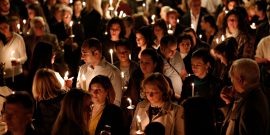Divine Rights and Human Rights
The eminent political theorist Harvey Mansfield once wrote that the “religious question” is the crucial one for the modern age, because it concerns the ultimate repository of authority and control. Is it human or is it divine?
“All pre-modern regimes,” said Mansfield, “are more or less based on divine right, on appeal to a principle that says men do not control themselves, that they are controlled by a higher power.”
The modern project, by contrast, is centrally concerned with liberation from that higher power:
“For if men cannot act effectively on their own, they will have to return to divine right, notwithstanding the objections that philosophers might propose. Liberation leads to reform. Liberation is not merely skeptical or negative; it is positive and progressive.”
One of the ways that modernity has answered this challenge is by appropriating “religion” and transforming it from a duty that one owes a creator to a duty that one owes to oneself. In law, one sees this transformation clearly in the standard that is conventionally applied by American courts to requests for religious exemptions from general laws, in which sincerity, individual commitment, or personal conviction are alone sufficient to bring a claim (though they are not sufficient to prevail).
That way of perceiving and understanding religion certainly mitigates certain dangers. It locates authority when it comes to religion solely in the individual, thereby removing all authority from the state. The state is disabled from judging in matters of religion both for epistemic and non-establishment reasons.
Furthermore, religion, as a legal category, becomes accessible to more and more Americans, irrespective of what they may believe. That is precisely what happened in the mid-20th century, as the “duty to the Creator” conception of religion was relaxed in favor of a conception locating all authority over religious questions in the individual conscience.
But this revision may also lead to problems, as religion steadily becomes dissociated from any power external to the individual believer. Law, of course, is responsive to and reflective of more general cultural movements, understandings, and programs, and a short post of this kind is no place to document those changes. But the transformation of religion from a divine phenomenon to a human one was brought home to me in reading the “Religion” section of the New York Times Book Review a few weeks ago. Four books about “religion” were reviewed—all favorably. Every one of them reflected this transformation.
The first, A None’s Story: Searching for Meaning Inside Christianity, Buddhism, Judaism, and Islam, was noted for its author’s itinerant “religious tourism” as she sampled this, that, and the other on her “journey.” The second, Putting God Second: How to Save Religion from Itself, criticizes those who have a noxious “God intoxication”; advises that Judaic moral teaching can be summed up by the pabulum, “What is hateful to you, do not do to your neighbor”; and recommends discarding traditional ideas of God in exchange for “an autonomous, universal moral consciousness that it is our job to interpret responsibly.”
The third, Revelation: A Search for Faith in a Violent Religious World, explores religion not as a matter of belief but as a human “action” responsible for “international human catastrophes.” Finally, Agnostic: A Spirited Manifesto is a “mischievous account” that describes agnosticism as “a positive orientation toward life all its own, one that embraces both science and mystery, and values the immediate joys of life.”
There is much to be said for valuing the immediate joys of life, of course. But all of these books share one key feature: they conceive of religion as an eminently human affair, satisfying the changeable longings of, as the New York Times reviewer puts it in closing, “our human, day-to-day life.”
Since my own area is law, I’ll close this entry with a question (to be picked up in future posts): Can the free exercise of religion, at least insofar as it requires or permits religious accommodation, long survive as a legal concept if this is now what religion means? Religious freedom was once considered as at least in part a divine right. The exercise of religious duties may have been owed by me, but the creditor was God. If it is now a purely human right—God having been not merely “put second” but erased—how does that change religion’s legal status?


